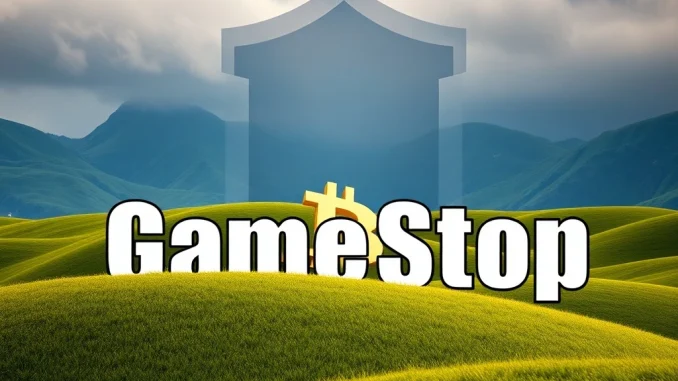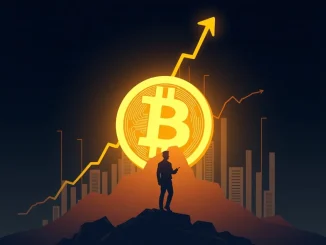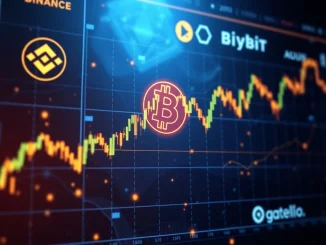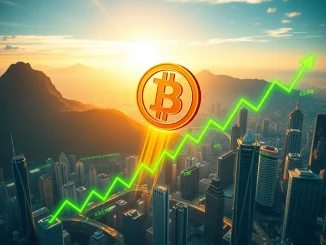
In a significant declaration that has sent ripples through both the traditional financial markets and the cryptocurrency world, GameStop CEO Ryan Cohen has unveiled the company’s intriguing stance on its Bitcoin holdings. This isn’t about chasing trends or mimicking others; it’s a deliberate, strategic move. For GameStop, Bitcoin isn’t just another asset class; it’s a vital component of their long-term financial resilience, serving primarily as an inflation hedge. This revelation highlights a unique approach from a company known for its dramatic turnaround story.
Why GameStop Views Bitcoin as an Inflation Hedge
The concept of an Bitcoin inflation hedge has gained considerable traction in recent years, particularly as global economies grapple with rising prices and currency debasement concerns. For GameStop, holding Bitcoin isn’t about speculative trading; it’s about protecting the purchasing power of its substantial cash reserves. In an environment where traditional fiat currencies might lose value over time due to inflation, scarce assets like Bitcoin are seen by some as a safe haven.
Ryan Cohen’s statement underscores this philosophy. He emphasized that GameStop is not looking to replicate the investment strategies of other companies. Instead, they are forging their own path, guided by a deep understanding of macroeconomic trends and a commitment to safeguarding shareholder value. This independent mindset is a hallmark of Cohen’s leadership since he joined the company.
Ryan Cohen’s Vision: Charting GameStop’s Own Course
Under the stewardship of Ryan Cohen, GameStop has undergone a remarkable transformation. From a struggling brick-and-mortar retailer, it has pivoted towards an e-commerce-first strategy, bolstered by a fervent community of retail investors. Cohen’s philosophy has consistently been one of self-reliance and innovation, refusing to be swayed by external pressures or conventional wisdom.
His declaration regarding Bitcoin reinforces this approach. It suggests a proactive measure to diversify the company’s treasury holdings away from purely fiat-denominated assets. This move speaks volumes about the executive team’s confidence in Bitcoin’s long-term value proposition as a hedge against systemic economic risks, rather than a short-term speculative play. It’s a testament to a management team willing to embrace unconventional strategies for the benefit of the company’s future.
The Power of GameStop’s Balance Sheet: Enabling Bold Moves
One of the critical enablers for GameStop’s unique Bitcoin strategy is its incredibly robust GameStop balance sheet. Cohen proudly noted the company’s formidable position with over $9 billion in cash and securities. This substantial financial cushion provides GameStop with unparalleled flexibility and the ability to make strategic, long-term decisions without immediate pressure from market fluctuations or liquidity concerns.
Here’s why a strong balance sheet is crucial for such a move:
- Risk Mitigation: With ample cash, GameStop can absorb the inherent volatility of Bitcoin without jeopardizing its core operations or strategic initiatives.
- Long-Term Horizon: A healthy balance sheet allows the company to adopt a long-term view on its Bitcoin holdings, weathering short-term price swings in pursuit of its inflation-hedging objective.
- Strategic Flexibility: It empowers GameStop to allocate a portion of its treasury to alternative assets like Bitcoin, diversifying its portfolio and potentially enhancing returns over time, while still maintaining significant liquidity for business operations and potential future investments.
This financial strength sets GameStop apart from many other companies that might consider similar crypto allocations but lack the necessary capital reserves to do so responsibly.
GameStop Bitcoin: A Unique Corporate Crypto Strategy
GameStop’s approach to holding Bitcoin is a fascinating case study in corporate crypto strategy. Unlike some public companies that have made significant Bitcoin purchases to attract investor attention or as a pure growth play, GameStop frames its holdings distinctly as an inflation hedge. This nuance is important:
- Focus on Preservation: The primary goal isn’t capital appreciation through speculation, but rather the preservation of purchasing power against inflationary pressures.
- Independent Path: It reinforces Ryan Cohen’s vision of GameStop charting its own course, rather than following the footsteps of companies like MicroStrategy or Tesla, whose Bitcoin strategies might be perceived differently.
- Risk-Adjusted Approach: While Bitcoin is volatile, holding it as a small percentage of a vast cash reserve minimizes the overall risk to the company, aligning with a prudent treasury management strategy.
This distinct framing could serve as a blueprint for other corporations looking to integrate digital assets into their treasury management, not just for growth, but for financial resilience in an uncertain economic landscape.
What Does This Mean for Investors and the Market?
GameStop’s declaration has several implications:
- Validation for Bitcoin: It adds another layer of institutional validation for Bitcoin as a legitimate store of value and an inflation hedge, moving beyond its speculative narrative.
- Inspiration for Other Corporations: Other companies with strong balance sheets might consider similar strategies, viewing Bitcoin less as a speculative asset and more as a treasury management tool.
- Investor Confidence in GameStop: For GameStop investors, this move could be seen as a sign of forward-thinking management, willing to protect the company’s assets against macroeconomic headwinds.
- Diversification Trend: It underscores a growing trend among sophisticated treasury managers to diversify beyond traditional cash and fixed-income assets in pursuit of inflation protection.
While the exact size of GameStop’s Bitcoin holdings remains undisclosed within the $9 billion cash and securities figure, the qualitative statement from CEO Ryan Cohen provides clear insight into the company’s strategic rationale.
Conclusion: GameStop’s Pioneering Stance
GameStop’s decision to publicly articulate its view of Bitcoin as an inflation hedge, driven by CEO Ryan Cohen’s independent vision and supported by a robust balance sheet, marks a significant moment. It’s a testament to a company that isn’t afraid to innovate and adapt, even in its treasury management. This strategic allocation highlights Bitcoin’s evolving role from a niche digital asset to a recognized tool for corporate financial resilience in an increasingly complex global economy. GameStop continues to prove that it’s not just a company riding the waves of market sentiment, but one actively shaping its own future with calculated, forward-looking decisions.
Frequently Asked Questions (FAQs)
Q1: Why is GameStop holding Bitcoin?
A1: GameStop CEO Ryan Cohen stated that the company holds Bitcoin primarily as an inflation hedge, meaning they view it as a way to protect the purchasing power of their cash reserves against the devaluation of traditional currencies over time.
Q2: What is Ryan Cohen’s philosophy regarding GameStop’s Bitcoin holdings?
A2: Ryan Cohen emphasizes that GameStop follows its own strategic path and does not seek to replicate the investment models of other companies. His philosophy is one of independence and proactive financial management, utilizing Bitcoin as a tool for long-term financial stability rather than speculative investment.
Q3: How does GameStop’s balance sheet enable this Bitcoin strategy?
A3: GameStop boasts a strong balance sheet with over $9 billion in cash and securities. This substantial financial position provides the company with the flexibility and stability to hold volatile assets like Bitcoin without jeopardizing its operations, allowing for a long-term view on its inflation-hedging objective.
Q4: Is GameStop’s approach to Bitcoin common among corporations?
A4: While some corporations hold Bitcoin, GameStop’s explicit framing of it as an ‘inflation hedge’ rather than a primary ‘investment strategy’ or ‘speculative play’ makes its approach somewhat unique. It highlights a focus on treasury preservation and diversification rather than pure capital appreciation.
Q5: Does GameStop plan to buy more Bitcoin?
A5: The statement from Ryan Cohen indicates a strategic rationale for existing holdings. While he didn’t explicitly state plans for future purchases, the emphasis on Bitcoin as an inflation hedge suggests it’s an ongoing component of their treasury management strategy, subject to their financial outlook and market conditions.
Q6: What are the potential risks of GameStop holding Bitcoin?
A6: The primary risk is Bitcoin’s inherent price volatility. While held as an inflation hedge, significant price drops could impact the value of that portion of their ‘securities’ holdings. However, GameStop’s strong balance sheet and long-term view aim to mitigate the impact of short-term fluctuations.



